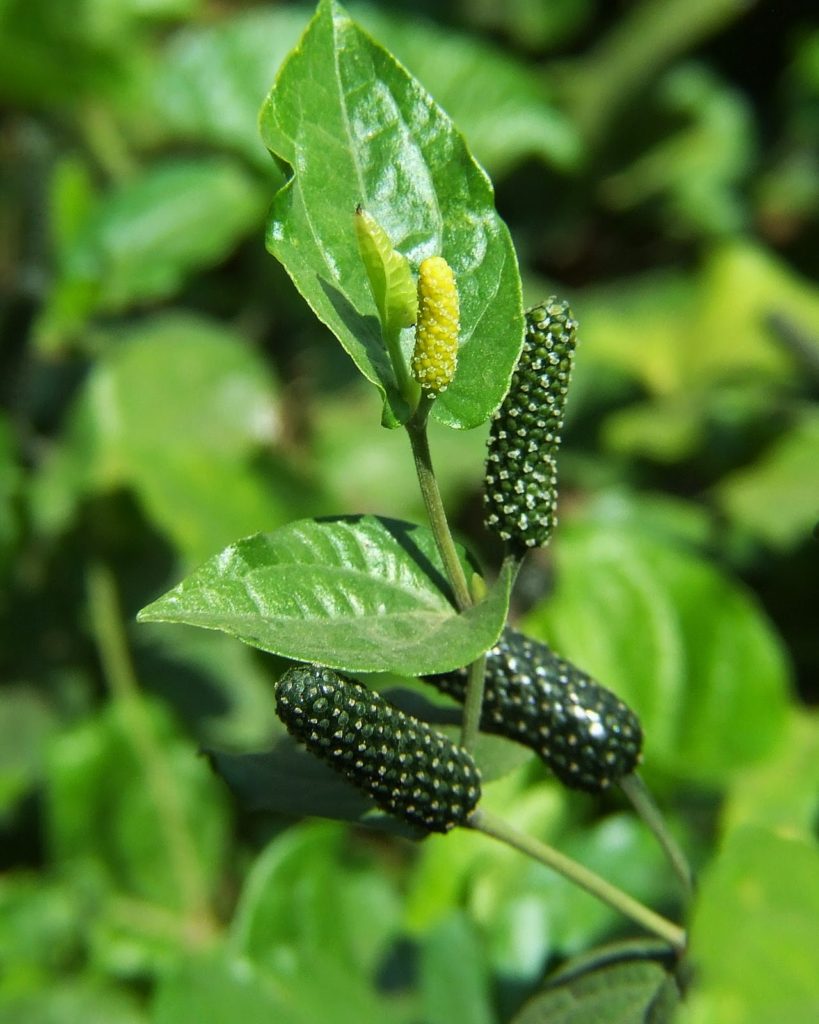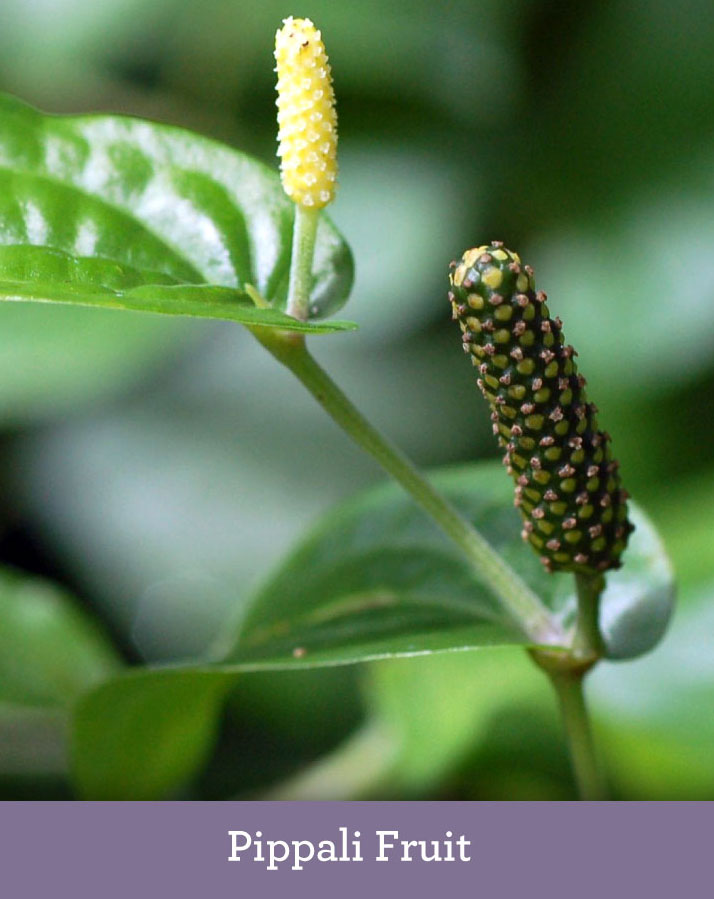
LONG PEPPER PIPPALI (PIPPALI)
Pippali is one of the traditional Indian plants that are simultaneously used both in the preparation of exquisite spicy dishes and for medicinal purposes. Even in ancient Ayurvedic texts, it is recorded as a remedy for many ailments; it is used both independently and as part of some medicinal forms. Pippali (or” piper longum linn ” “pepper long”) is the fruit of a climbing perennial plant that looks like thin cones, with a characteristic sharp aroma and sharp taste.
Pippali grows in the hot regions of India, as well as in the central Himalayas. Pepper is harvested in January, at a time when the fruits are still in an unripe state and have a green color because at this stage they show the most pungent taste and special medicinal properties. The collected fruits are dried in the sun until they acquire a gray or blackish color. On sale, pippali is most often found in its whole form (so it retains its valuable properties longer).
In Ayurveda, pippali prescribes a multidirectional action. He was first mentioned in the Charaka Samhita among the so-called “rasayanas”. But to a greater extent, it is described as a remedy for the treatment of respiratory diseases and gastrointestinal disorders.
Currently, pippali is widely used by Indian traditional doctors in the treatment and prevention of colds, runny nose, cough, laryngitis, bronchitis, asthma, as well as many problems of the digestive and circulatory system, in conditions of immunodeficiency.
Modern scientific studies have proven the actions of pippali, which increase the protective properties of the liver and strengthen the immune system. Pippali exhibits anti-inflammatory, decongestant, antispasmodic, expectorant, anti-allergenic, anthelmintic, tonic properties, stimulates the digestive glands.
Long pepper pippali (Pippali) has found wide application in Ayurvedic medicine, especially because of its ability to improve the digestive fire (Agni) and burn toxins (Ama). Pippali can be excellent herbal support at any time of the year. However, due to its powerful properties of cleansing and rejuvenation of the lungs, the best time to use it is in the spring season (Kapha). Although spring is associated with many beautiful aspects, this time of year is also well known as the season of allergies, congestion, colds, and coughs. Ayurveda states that the spring season is the main time of the year for Kapha dosha and therefore the imbalances of Kapha will flourish. Adding long pepper pippali to your diet in the spring will be a great addition to avoiding the common problems that this season brings. Pippali is much softer than its relative black pepper, so pippali can even be used moderately and for Pitta-type Doshas because of its sweet aftertaste (vipak).
Thus, pippali can be a safe and effective option for most digestive disorders, even when Pitta increases in the body. Please note that this is a very potent vegetable spice, and it should be used only in small doses (no more than 1-3 grams per day), although Kapha can usually afford to take a little more (up to 5 grams per day).
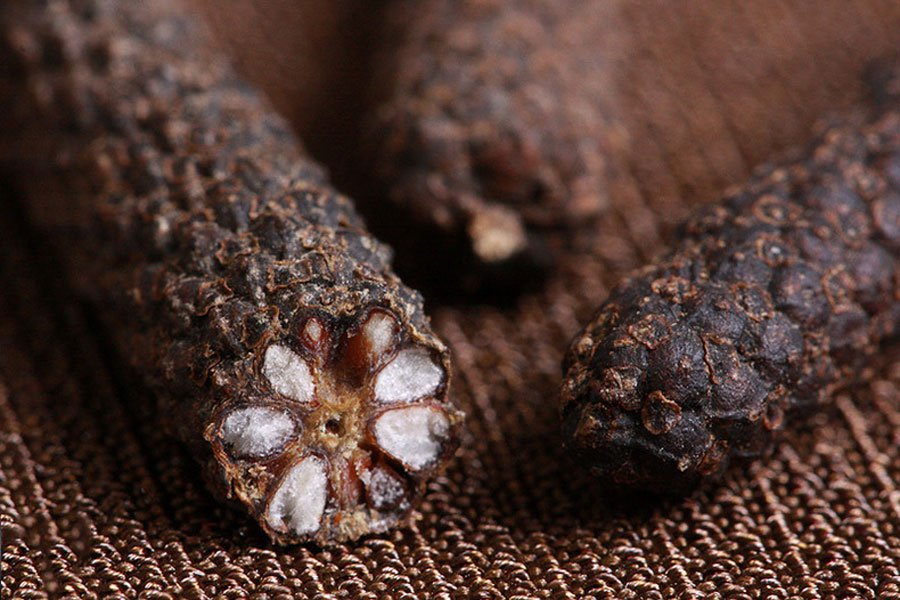
THE AYURVEDIC QUALITIES OF PIPPALI
| Taste (Rasa) |
Katu (pungent) |
| Potency (Veerya) | Ushna – Hot potency |
| Post-Digestion (Vipaka) | Madhura – Undergoes sweet taste conversion after digestion |
| Qualities/Property (Guna) | Laghu (lite), Teekshna (strong, piercing) |
| Karma (Influence on doshas) | Reduces Vata and Kapha, increases Pitta (with excessive use) |
| Impact on tissues (Dhatu) | Plasma, blood, adipose tissue, bone marrow, reproductive tissue |
| Effect on the body’s systems | Digestive, respiratory, and reproductive systems. It has analgesic, anthelmintic, carminative, expectorant effects. An aphrodisiac. |
| Dosage and duration of use | For preventive purposes -1 g. for 2-3 months, for therapeutic purposes – 3-5 g. until the symptoms of the disease disappear. The maximum dose is 5 g. |
| Contraindications |
Excessive Pitta dosha, intestinal diseases |
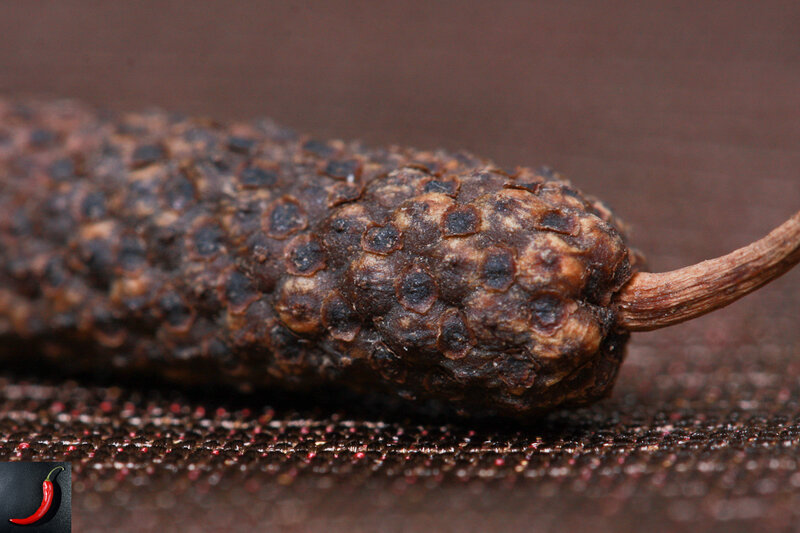
PHYTOCHEMISTRY
The most noticeable ingredient of pippali is piperine (up to 5%) – an alkaloid that is responsible for the sharpness of various varieties of peppercorns.
USEFUL PROPERTIES OF LONG PEPPER PIPPALI
- Cleanses the blood;
- Improves digestion;
- Reduces gas and bloating;
- Cleanses the body, especially the respiratory system;
- Reduces fever;
- Improves the condition of colds;
- Improves skin condition and complexion;
- Reduces hemorrhoids;
- It has antimicrobial, anti-parasitic, and antiseptic effects;
- Improves the functioning of the liver, gallbladder, and spleen;
- Reduces menstrual disorders (amenorrhea and dysmenorrhea);
- Enhances memory and intelligence;
- Improves blood circulation;
- Increases the mobility of spermatozoa;
- Increases sexual activity (both men and women – impotence, low libido, premature ejaculation);
- Helps to reduce body weight;
- Increases the effect of other herbs when used together;
- Reduces the pain of gout/podagra and rheumatoid arthritis.
Pippali is also used to make churna called trikatu, which literally means “three kinds of pepper”.
It also includes a close relative of pippali-black pepper and ginger. This herbal elixir can be called almost magical because of its wide range of action and its high degree of effectiveness. It helps with flu and colds, reduces swelling in the body and treats digestive problems. In addition, trikatu acts as an antioxidant and rejuvenates the Agni (fire) energy inside us. It is also used as a concomitant therapy to facilitate the assimilation of other foods and medicines in the body.
You can also use a more intense variation of trikatu, which includes nutmeg, coriander, and ayovan or anise. All these herbs, together with three types of pepper, are taken in equal parts, then they are crushed and finally stored in glass jars. In addition to eliminating toxins, this improved version of trikatu supports coughing and improves the overall state of Kapha and Vata energies in the body.
Another variety of Trikat includes a smaller amount of Pippali and a more bibhitaka plant (from Latin-Terminalia Billerica; also called bahera) – this Ayurvedic medicine treats persistent respiratory problems such as chronic cough.
In addition, the active ingredient of pippali pepper-piperine can counteract chemical damage to the liver, since it is able to protect the liver and limit its fibrosis, as well as improve its regeneration. Long-term consumption of supplements and dishes with a high content of pippali is an excellent choice for a dietary supplement when we want to clear the accumulated toxins from our liver. A series of pippali treatment methods in combination with an adequate yoga program can be especially useful for therapy and stimulation of the regenerative abilities of our liver.
Due to its warming properties, pippali is an excellent choice for cold days, but it should not be consumed in hot weather or if there are symptoms of dehydration: such as extreme thirst, dry mouth or burning sensation in the urine. the intestinal tract. This pepper cannot be used as an ordinary spice, although exotic.
It is not recommended for people with a predominant pitta dosha, because it can bring this energy out of balance. It should also not be used by pregnant women and during menstruation, as well as by infants and young children. It is also not recommended for women who are planning to have a child in the near future. But it is widely used in Ayurveda as an absolutely safe and effective remedy that relieves colds in nursing women, of course, in small quantities.
In addition, it is believed that pippali pepper also has a positive effect on the reproductive system and sexual energy. Due to its warming ability, the fruits of the plant act as an aphrodisiac and improve the functions of the corresponding organs.
Because of its antioxidant properties, pippali pepper is also used as a rejuvenating agent. On its basis, many cosmetic lines were created, as well as a number of food additives and potions for longevity and impeccable appearance.
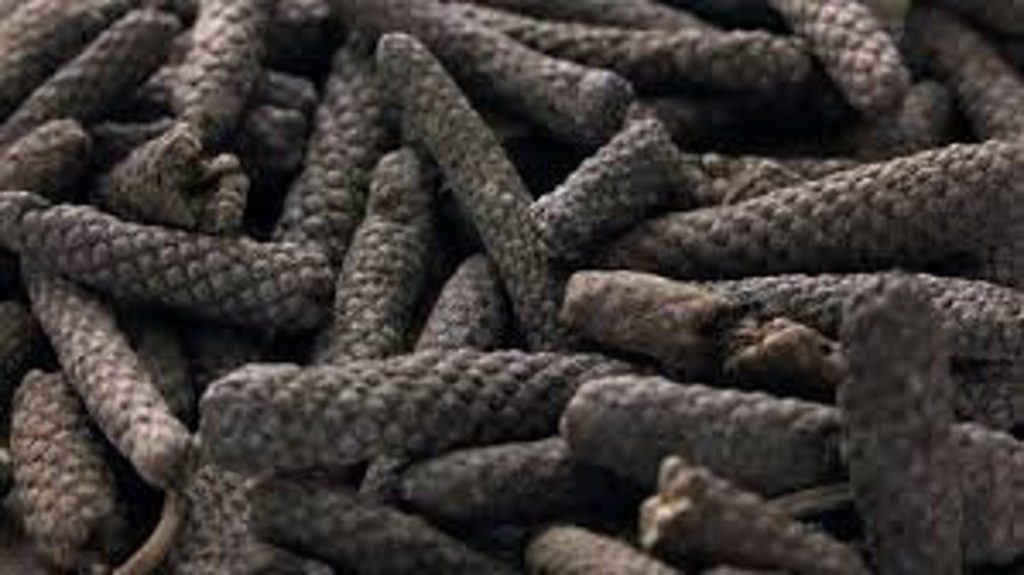
Long pepper Pippali is widely used in Ayurvedic pharmacology and is part of many traditional medicines:
- Trikatu Churna
- Saraswati Churna
- Hingwashtak Churna
- Maha Sudarshan Churna
- Tikta Grita
Pippali has a wide range of different benefits for our health, and therefore there are many ways to use pippali in a home medicine cabinet. An easy way to get the numerous benefits of pippali as a preventive remedy is to use it daily instead of black pepper (or in addition to it), adding it when cooking. As a medicinal product, long pepper pippali is used in the following doses:
| Diseases | Method of application |
| Allergies, cough, cold, mucus congestion | Mix ¼ teaspoon of turmeric, ¼ teaspoon of ginger (dry), 1/8 teaspoon of pippali, 1 teaspoon of honey, and ½ cup of warm water. Take it in the morning and in the afternoon |
| Fever, flu | Mix ¼ teaspoon of pippali in 1 cup of ginger tea, add 1 teaspoon of honey. Take 3 times a day |
| Hemorrhoids | Take ½ cup of homemade yogurt and ¼ teaspoon of pippali. Take it daily after breakfast and after lunch |
| Menstrual disorders | Mix 2 tablespoons of aloe vera juice and 1/8 teaspoon of pippali in ½ cup of warm water. Take 3 times a day before meals |
| Skin problems | Mix 2 tablespoons of aloe vera juice, ¼ teaspoon of turmeric, and 1/8 teaspoon of pippali in ½ cup of warm water. Take 3 times a day with meals |
| Low libido (men) | Mix in ¼ cup of warm water ½ teaspoon of ashwagandha, 1/8 teaspoon of pippali, and 1 teaspoon of ghee (Ghee). Take 3 times a day before meals |
| Low libido (women) | Mix in ¼ cup of warm water ½ teaspoon of Shatavari, 1/8 teaspoon of pippali, and 1 teaspoon of ghee (Ghee). Take 3 times a day before meals |
| flatulence, meteorism, flatulency | Take 1 g of pippali powder and 2 g of salt, mix with ½ cup of homemade yogurt. Take 3 times a day after meals |
| Obesity | Mix ¼ teaspoon of pippali with ½ teaspoon of honey, take it with water 2 times a day for 2-3 months |
| Insomnia | Mix 2-3 grams of pippali and 1 teaspoon of honey in a glass of water and drink it 30-40 minutes before bedtime |
| Toothache | Mix ¼ teaspoon of pippali, turmeric, and salt with mustard oil until a paste-like state is obtained, apply to the affected tooth |
| Hiccups | Mix ¼ teaspoon of pippali pepper, licorice root, and sugar in a glass of water, add a little lemon juice |
| Liver enlargement | Taking 3 grams of pippali with honey twice a day helps to reduce an enlarged liver |
THE USE OF PIPPALI IN COOKING
Undoubtedly, pippali pepper, like real pepper, has a sharp taste and a pleasant aroma, but it is a little softer than many other varieties of pepper. Pippali pepper is a great addition to dishes made from vegetables, mung dal or lentils. Even in ancient times, long pepper pippali was used in cooking because of its sharp taste and spicy aroma. Currently, it has been displaced from the market by black pepper and chili pepper, as cheaper analogues. However, those who understand the full value of pippali continue to use it in various recipes, including some desserts, because it has a sweet aftertaste (Vipaka) and improves digestion. Therefore, long pepper pippali is used not only for medicinal purposes but also is a good addition in the preparation of various dishes, contributing to the normalization of digestion and strengthening the digestive fire (Agni).
MUNG DAL SOUP WITH PIPPALI
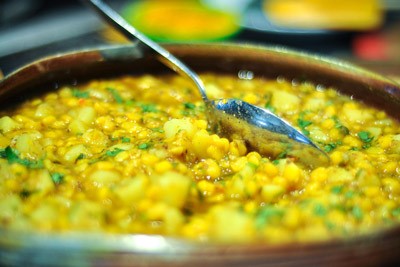
| Ingredients | Influence on doshas | Quantity | Cooking method |
| Tomatoes (medium) | V↑ P↑ К↑ | 4 pcs. |
Bring the water to a boil, add the mung dal previously soaked overnight, cook over low heat for 40-45 minutes. Melt the ghee in a frying pan, add mustard seeds, pippali, cumin, ginger, turmeric, asafoetida. Heat the spices for 2-3 minutes, add crushed garlic, salt, sugar. Finely chop the tomatoes, add them to the pan with mung dal. After 5-7 minutes, add the spice mixture and lemon juice, leave on the fire for another 3-5 minutes. When serving, garnish with chopped cilantro |
| Mung dal or
lentils |
V P K =, К↑ (in case of excessive use) *
P↓ К↓V↑ (in case of excessive use) ** |
¾ cup | |
| Water | V↓ P↓ K↑ | 6 glasses | |
| Cilantro | V P K = | 2 tablespoons | |
| Pippali (ground) | V↓ К↓ P↑ (in case of excessive use) | ¼ – 1/2 teaspoons | |
| Garlic | V↓ P↑ K↓ | 1 clove | |
| Cumin | V↓ P↑ K↓ | 1 teaspoon | |
| Mustard seeds | V↓ P↑ K↓ | 1 teaspoon | |
| Ginger (ground) | V↓ K↓P↑ (in case of excessive use) | ½ teaspoon | |
| Turmeric | V↓ K↓P↑ (in case of excessive use) | ½ teaspoon | |
| Asafoetida | V↓ P K↓ | ½ teaspoon | |
| Ghee | V↓ P↓ K↑ (in case of excessive use) | 2 teaspoon | |
| Lemon Juice | V↓ P↑ К↓ | 1-2 tablespoons | |
| Cane sugar | V↓ P↓ К↑
|
1 tablespoon | |
| Salt | V↓P↑К↑ | ½ teaspoon |
* Mung dal
**Lentils
FRUIT TRUFFLES
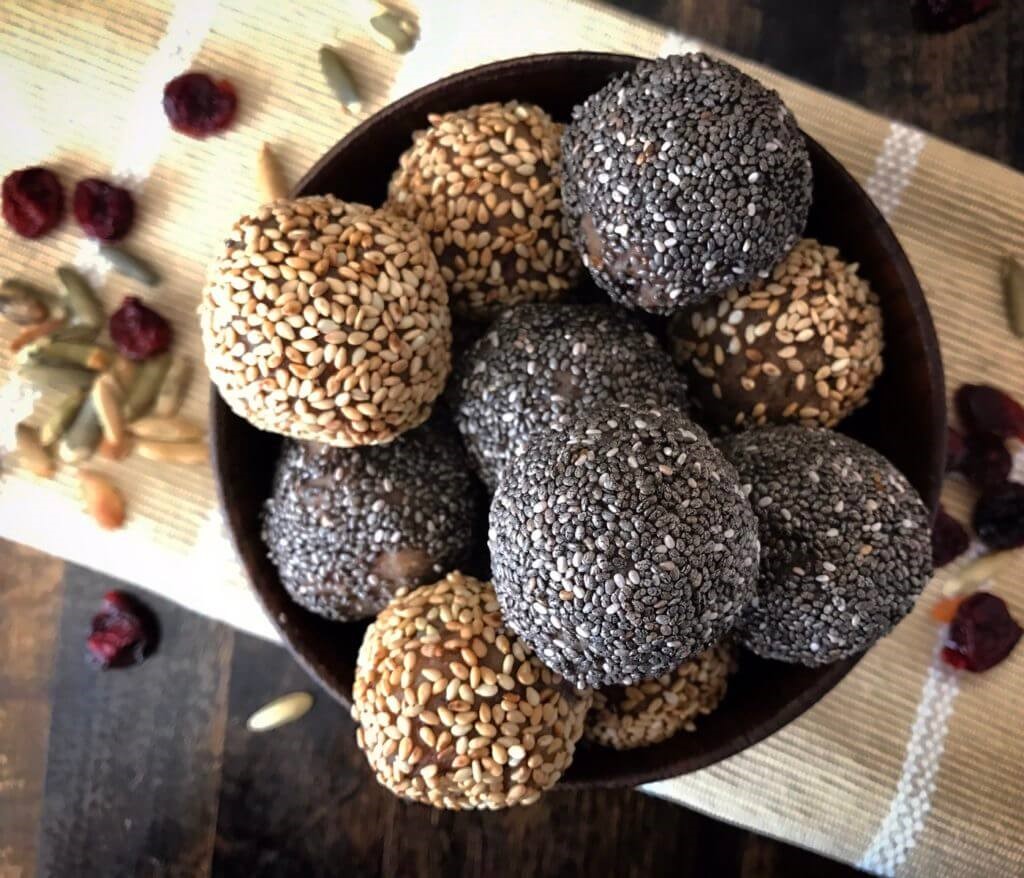
| Ingredients | Influence on doshas | Quantity | Cooking method |
| Dates | V↓ (soaked) P↓ K↑ | ½ cup | Cut the dates, figs, dried apricots, and raisins into small pieces. Add the chopped almonds (pre-soak overnight and remove the skin) and lightly toasted cashews, mix everything thoroughly with your hands, add coconut or ghee oil (Ghee) mix to a uniform paste. Then add half of the honey, pippali pepper, nutmeg and mix well again. Roll small balls out of the mixture, dip in honey and roll in toasted sesame seeds. Place the balls on a plate and refrigerate for 15-20 minutes. Ready-made fruit truffles can be stored in a closed container at room temperature for up to ten days. |
| Fig | V↑ P↑ К↑ | ½ cup | |
| Raisin | V↓ (soaked) P↑ К↑ | ¼ cup | |
| Dried apricots | V↓ (soaked) P↑ К↓ | ¼ cup | |
| Almonds | V↑ P↑ К↑ | ½ cup | |
| Cashews | V↑ P↑ К↑ | ½ cup | |
| Honey | V↓ P↑ К↓ | ½ cup | |
| Sesame seeds | V↑ P↑ К↑ | ½ cup | |
| Coconut oil or
Ghee (Ghee) |
V↓ P↓ К↑*
V↓ P↓ К↑ (in case of excessive use)** |
2 tablespoons | |
| Pippali (ground) | V↓ К↓P↑ (in case of excessive use) | 2 teaspoons | |
| Nutmeg | VPК= | 1 teaspoon |
* Coconut oil
** Ghee
Long pepper pippali reduces excess body weight, helps to burn toxins (Ama) in adipose tissue, and prevents their formation due to digestive disorders. Pippali effectively improves the absorption of nutrients, minerals and vitamins, reduces obesity, cleanses the skin, smoothes wrinkles, and slows down the aging process.
Pippali cleanses the lungs, fills the lung tissue with additional energy to prevent cough, fever, asthma, bronchitis, laryngitis, and pneumonia.
Pippali has long been used to strengthen bones and maintain the integrity of the skeleton, reduces back pain, arthritis, rheumatism, fractures, sprains.
The warming quality of pippali improves blood circulation and tones the heart muscle. With improved circulation, all vital organs are saturated with oxygen and function more efficiently.
Pippali pepper, added in a small amount, will give a pleasant shade of smoked and a slight sharpness to the dish. But added in excessive amounts, it can kill the smells of other ingredients, so you should be careful in the proportions.
It should be kept in mind that according to Ayurvedic texts, pippali has a sharp taste, but a sweet effect after digestion, it is heavy, slightly oily; hot, and moisturizing.
It has a very powerful action and instantly manifests its effects. With regular use, it increases Pitta, due to the quality of heat.
Therefore, it is not necessary to use long pepper separately on a regular basis or in excessive quantities.
